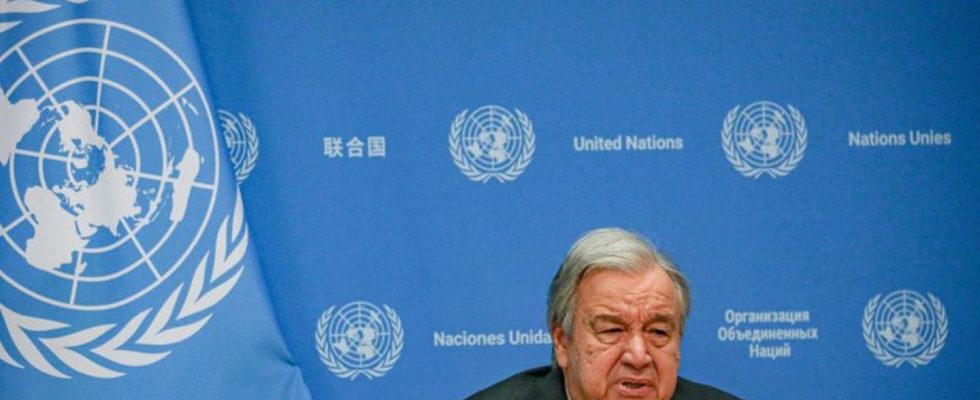War in the Middle East
Biden calls Israel’s actions in Gaza excessive
In light of reports of an allegedly impending Israeli military offensive in Rafah, UN Secretary-General António Guterres warned of a humanitarian catastrophe and consequences for the entire region. photo
© Bianca Otero/ZUMA Press Wire/dpa
The USA has long been urging Israel to improve the protection of people in the Gaza Strip. Now the announcements are becoming increasingly clear. The overview.
Given the catastrophic humanitarian situation in the Gaza Strip, US President Joe Biden has sharpened his tone towards the Israeli government and described the armed forces’ actions against the Islamist Hamas as disproportionate. “I believe the response in Gaza is excessive,” Biden said at the White House. There are many innocent people who are starving, in need or even dying. “That has to stop.”
The day before, US Secretary of State Antony Blinken had struck a noticeably critical tone during a visit to Israel and urged the Israeli leadership to do more to protect civilians in the Gaza war. The dehumanization that Israel experienced in the Hamas massacre in October “cannot be a license” to dehumanize others, Blinken said. The daily sacrifices that the military operations demanded of the innocent civilian population were “still too high.”
On October 7th, terrorists on behalf of Hamas carried out a devastating massacre in Israel, especially against civilians. Since then, Israel has been waging war against Hamas in the Gaza Strip. The high number of civilian casualties in the Gaza war and the disastrous living conditions of the Palestinian civilian population have sparked sharp international criticism of Israel’s actions.
UN fears humanitarian catastrophe if Rafah is attacked
In light of reports of an allegedly impending Israeli military offensive in Rafah in the south of the Gaza Strip, UN Secretary-General António Guterres warned of a humanitarian catastrophe and consequences for the entire region. “Half of the Gaza Strip’s population is now crowded into Rafah with nowhere else to go. Reports that the Israeli military plans to attack Rafah next are alarming,” Guterres wrote on the news platform X, formerly Twitter.
“Such an action would further exacerbate the humanitarian nightmare and could have untold consequences for the entire region.” The US government also warned of a large-scale offensive. “We believe that a military operation at this time would be a catastrophe for these people,” said National Security Council Communications Director John Kirby. “We wouldn’t support that.”
Demonstrations in Israel over a possible hostage agreement
Meanwhile, in Israel, a number of people demonstrated for and against a possible hostage agreement with Hamas. In Jerusalem, thousands protested against negotiations with Israel’s enemies and for a continuation of the Gaza war, several Israeli media reported. At the same time, hundreds of people in Tel Aviv protested for a deal to secure the release of the hostages still held in the Gaza Strip.
Israel’s war cabinet met in the evening to discuss a possible deal with Hamas. Demonstrators accused Israeli Prime Minister Benjamin Netanyahu of taking his political survival more seriously than the fate of the hostages. Netanyahu’s right-wing extremist coalition members are now threatening to collapse the government coalition if the prime minister makes concessions to Hamas as part of a hostage deal.
Report: Contact with Hamas boss Sinwar is said to have been broken off
According to an Israeli media report, high-ranking Hamas members have had no contact with the leader of the Islamist organization in the Gaza Strip for several weeks. Jihia al-Sinwar was also not involved in Hamas’s recent response to Israel to an international mediation proposal for a hostage agreement, Israeli broadcaster Kan reported. Accordingly, Sinwar fears that his hiding place in the Gaza Strip could be discovered through surveillance of any communications. The information cannot be independently verified.
EU military operation: Area should also include the sea off Iran
The EU naval operation in the Middle East, which is about to begin, could also protect merchant ships from possible threats from Iran. According to information from the dpa, the decision for Operation Aspides shows that European warships are to be deployed not only in the Red Sea and the Gulf of Aden, but also in the Strait of Hormuz as well as in the Persian Gulf and the Gulf of Oman to accompany merchant ships can. All three of these sea areas lie off the coast of Iran. The primary aim of the EU operation is to protect merchant ships from attacks by the militant Islamist Houthis from Yemen.
Israel’s army attacks Hezbollah commander in Lebanon
The Israeli armed forces say they have attacked a high-ranking Hezbollah commander from the air in southern Lebanon. The army said this was a response to rocket launches from Lebanon towards Israel, in which, according to the military, Israel was said to have been involved. The Iranian-allied Hezbollah militia reported several injuries from the Israeli airstrike. One person is in “critical condition”. An Israeli drone directly hit a car in the town of Nabatieh, Lebanese security circles said. There were two people in the car.
What is important today
Chancellor Olaf Scholz (SPD) meets with US President Joe Biden in Washington. In addition to the war in Ukraine, the focus will also be on the situation in the Middle East. During their conversation, Scholz and Biden are likely to look to the future: What will happen next for Israel and the Palestinians after the Gaza war? Both support a two-state solution. But which path could lead to this is currently completely unclear.

